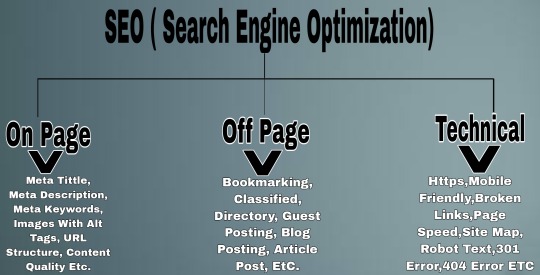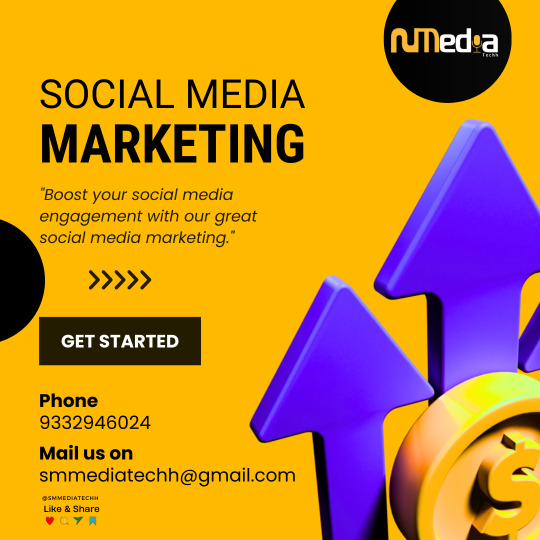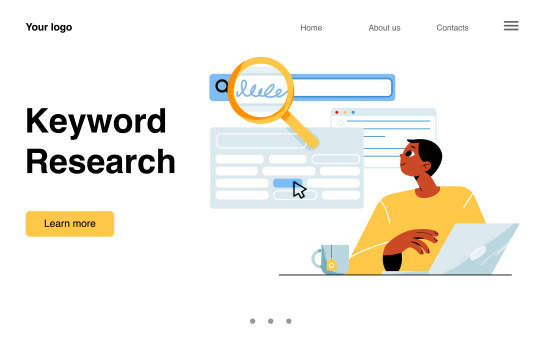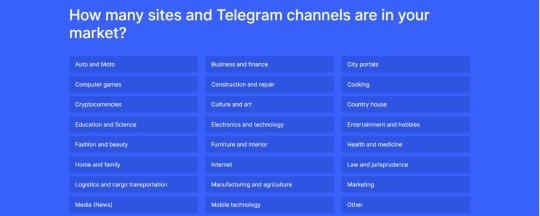#Search engine marketing strategies
Explore tagged Tumblr posts
Text
#Paid search vs. organic search#Organic SEO vs. PPC#Search engine marketing strategies#Google Ads vs. organic traffic#Cost-effective digital marketing#SEO vs. paid search benefits#Organic search lead generation#Paid media vs. organic media#Best marketing strategy for businesses#Search engine optimization vs. pay-per-click
0 notes
Text
Maximizing Your Budget with Smart Search Engine Marketing Strategies | Promfly
Maximizing your budget with smart search engine marketing strategies involves a mix of precision and efficiency. Start by setting clear, measurable goals to guide your campaign, ensuring you focus on metrics that matter most, such as ROI or cost-per-acquisition. Utilize keyword research tools to identify high-performing keywords that balance search volume with competition. Implement ad extensions to enhance visibility and provide more information to potential customers. Continuously monitor and adjust your bids based on performance data to avoid overspending on underperforming ads. Leverage A/B testing to refine your ad copy and landing pages, improving conversion rates while staying within budget. Optimize your campaigns by analyzing user behavior and adjusting targeting options to reach the most relevant audience. By combining these strategies, you can stretch your marketing budget further, achieving better results and maximizing the return on your investment.
0 notes
Text
#digital marketing#search engine optimization#seo services#graphic designing#digital marketing agency#marketing strategy#best digital marketing company
3 notes
·
View notes
Text
SEO Hindi Me Kya Hai? Know Complete Information In Just 2 Minutes

Curious about SEO Kya Hai? Search Engine Optimization (SEO) is the process of improving website visibility on search engines like Google.
By optimizing content and following best practices, you can increase organic traffic to your site. It involves keyword research, meta tags optimization, link building, and more.
Understanding SEO is crucial for boosting online presence and reaching a wider audience. Stay tuned for more insights on how to enhance your digital marketing strategy with effective SEO techniques!
. 🌐 Click the link above to read more! . Contact us here:-👇 . 📧 Official Gmail ID: [email protected] . 👉 Follow us to get more informative posts: @akgtechinfo
#what is seo#seo tips#digital marketing#search engine optimization#seo basics#seo for beginners#online marketing#seo training#grow your business#digital strategy#inbound marketing#seo
4 notes
·
View notes
Text

In today’s digital world, social media has become an essential part of our daily lives. Whether you're sharing a photo with friends or following your favorite brands, social media platforms are everywhere. But did you know they are also powerful tools for businesses? That’s where social media marketing comes in.
What is Social Media Marketing?
Social media marketing is the use of social platforms like Facebook, Instagram, Twitter, and LinkedIn to promote your business, connect with your audience, and build your brand. It's about creating and sharing content that engages your audience and encourages them to interact with your business.
Why is Social Media Marketing Important?
Reach a larger audience: Billions of people are on social media. This means you can reach potential customers all over the world.
Boost brand awareness: Social media helps people get familiar with your brand, products, and services.
Engage with your audience: You can talk directly to your customers, answer questions, and get feedback.
Drive traffic to your website: By sharing content with links to your site, you can bring more visitors to your pages.
Cost-effective marketing: Many social media platforms offer free tools to promote your business. Paid ads are also affordable and can be targeted to the right audience.
Key Social Media Platforms for Marketing
Facebook: With over 2.8 billion users, Facebook is ideal for reaching a wide audience. Businesses can create pages, post updates, run ads, and engage with followers.
Instagram: Instagram is perfect for visually-driven brands. If your business relies on photos or videos, like fashion, food, or art, Instagram is a great choice.
Twitter: Twitter is useful for sharing quick updates, news, and engaging in conversations. It's also great for customer service interactions.
LinkedIn: If your business targets professionals or B2B clients, LinkedIn is the best platform. It’s excellent for networking and establishing industry authority.
TikTok: This platform is a must if you want to reach younger audiences with creative, fun, and short video content.
Tips for Effective Social Media Marketing
Know your audience: Who are your customers? What are their interests? Understanding your audience helps you create content that speaks to them.
Post consistently: Regularly posting helps keep your audience engaged and builds a strong online presence. Tools like Hootsuite or Buffer can help schedule posts.
Create valuable content: Your posts should be interesting, informative, or entertaining. Share tips, behind-the-scenes looks, or answer customer questions.
Use hashtags: Hashtags help people find your posts. For example, if you’re posting about social media marketing, use hashtags like #SocialMediaMarketing or #DigitalMarketing.
Engage with your followers: Reply to comments, like posts, and thank people for their support. Engaging with your audience builds trust and loyalty.
Analyze and adjust: Use analytics tools like Facebook Insights or Instagram Analytics to see what’s working and what’s not. Adjust your strategy based on the data.
Final Thoughts
Social media marketing is one of the most effective ways to grow your business in today’s digital landscape. By understanding your audience, consistently posting valuable content, and engaging with your followers, you can create a strong online presence and boost your brand. Start small, experiment with different platforms, and soon you’ll see the power of social media marketing in action!
#digital marketing#social marketing#social media#agency#digital marketing services#social media marketing#seo services#seo#best digital marketing company#search engine optimization#search engine marketing#smmediatechh#social media update#social media strategy#services#social media services
5 notes
·
View notes
Text
The Relevance of Conducting Keyword Research in Digital Marketing
In a world dominated by technology where businesses require visibility to succeed. The only way to cut through the noise of millions of websites is to know what your audience wants, and then create content that addresses that need. This is where conducting keyword research comes in- it is a critical building block that goes into constructing a good digital marketing strategy.
Understanding Keyword Research :
In most cases, users do not type in full sentences into search engines- instead, they search for keywords and phrases. Keywords are what connect the questions asked by the user, to a piece of content prepared to answer the query. Identifying keywords allows businesses to create content that users are looking for, increasing their chances of ranking higher in search results, and making more sales.

Why Is Keyword Research Important?
A Better Return On Investment (ROI): Returning from targeted ads is higher than any other form or investing in advertising channels, for example: Pay per click adverts.
Increased Visibility: It is extremely hard to get noticed as a new website, and investing in keywords will allow you to boost your website’s organic traffic.
Understanding Audience Intent: Good keyword research helps you understand what your target audience is looking for and how they phrase their queries. You can, therefore, create content that directly answers their needs, thus building trust and fostering engagement.
3. Competitive Advantage: Analyze the keywords your competitors are targeting, find gaps in their strategy, and identify opportunities to differentiate your content. This way, you are ahead in a crowded marketplace.
4. Cost-Efficient Advertising: Keyword research for paid campaigns is very important. For example, Google Ads has to be able to select appropriate cost-effective, high-performing keywords. So, targeting the right keywords really minimizes waste and maximizes ROI.
5. Content Strategy Development: It acts as a roadmap for content strategy. By creating blog posts, videos, and other such assets that actually resonate with the audience while satisfying the search engines, it provides a well-researched list of keywords.
Effective Keyword Research Tips
Use Tools: Utilize Google Keyword Planner, SEMrush, or Ahrefs to uncover the volume, competition, and trend of your keyword.
Long Tail Keywords: Be more specific as they tend to have less competition and more chances of conversion
Search Intent: Identify if it is an information intent, a navigational intent, or transactional intent to use it appropriately for your content.
Keep fresh: trends in searches change, and your keyword approach should be reviewed regularly.
Keyword research is far from a technical task; it's a strategic initiative that bestows business the power to connect with audiences more effectively. The time and resources you invest in understanding the language of your customers set you up for long-term digital marketing success. Whether you are optimizing for organic search or planning a PPC campaign, keyword research is the compass guiding your efforts toward measurable results.
#Digital Marketing#SEO Strategy#Search Engine Optimization#Audience Intent#Content Marketing#PPC Campaigns#Long-Tail Keywords#Marketing Tips#Competitive Analysis#Online Advertising#Marketing Strategy#Website Traffic#Organic Search#Digital Marketing Trends#Keyword research#keyword research tools
2 notes
·
View notes
Text
The Ultimate SEO Checklist for Your Shopify Store
In today’s competitive eCommerce landscape, having a visually appealing Shopify store isn’t enough. To attract potential customers, you need a solid SEO strategy. Search Engine Optimization (SEO) helps your online store rank higher in search engine results, increasing visibility and driving organic traffic. Here’s your ultimate SEO checklist for optimizing your Shopify store.
1. Keyword Research
Start with thorough keyword research. Use tools like Google Keyword Planner or SEMrush to identify keywords relevant to your products. Focus on long-tail keywords that reflect your specific offerings, as they often have less competition and higher conversion rates.
2. Optimize Product Titles and Descriptions
Once you have your keywords, incorporate them naturally into your product titles and descriptions. Ensure that your titles are clear and descriptive, and that your descriptions provide valuable information that helps customers make purchasing decisions.
3. Use Alt Text for Images
Images are crucial in eCommerce, but they also need to be optimized for SEO. Use descriptive alt text for every image, incorporating relevant keywords. This not only helps search engines understand your images but also improves accessibility for visually impaired users.
4. Create SEO-Friendly URLs
Your store’s URLs should be simple, descriptive, and include relevant keywords. For example, instead of a URL like shopify.com/product123, use shopify.com/organic-cotton-tshirt. This improves both SEO and user experience.
5. Enhance Site Speed
A fast-loading website is vital for retaining customers and improving SEO rankings. Use tools like Google PageSpeed Insights to analyze your site’s speed and make necessary improvements, such as optimizing images and minimizing JavaScript.
6. Mobile Optimization
Ensure your Shopify store is mobile-friendly. With a significant portion of online shopping done on mobile devices, a responsive design is essential for both user experience and SEO.
7. Implement Internal Linking
Internal links help search engines understand the structure of your site and keep users engaged. Link relevant products, blog posts, and categories within your store to improve navigation and SEO.
8. Utilize Schema Markup
Schema markup enhances your store’s appearance in search results. Implementing this code helps search engines understand your content better and can lead to rich snippets, improving click-through rates.
9. Monitor Analytics
Use tools like Google Analytics and Shopify Analytics to track your store’s performance. Monitor metrics like traffic sources, bounce rates, and conversion rates to identify areas for improvement.
10. Build Quality Backlinks
Lastly, focus on building quality backlinks. Reach out to influencers, bloggers, and industry-related websites to gain links back to your store. Quality backlinks improve your domain authority and help boost search rankings.
Conclusion
Optimizing your Shopify store for SEO is an ongoing process that requires dedication and strategy. By following this ultimate SEO checklist, you’ll enhance your online visibility, attract more visitors, and ultimately drive sales. Start implementing these tips today and watch your Shopify store thrive!
#SEO#Shopify#eCommerce#Digital Marketing#Website Optimization#Online Store#SEO Checklist#Search Engine Optimization#Shopify Tips#Marketing Strategy
3 notes
·
View notes
Text
Cybersecurity vs. SaaS Marketing: Why Selling Security Is a Whole Different Game
Selling cybersecurity isn't the same as selling SaaS. This post explores the unique challenges and strategies involved in marketing security solutions. Learn why trust, risk aversion, and compliance play a crucial role in cybersecurity sales, and how to tailor your approach for success.

In the world of B2B tech, marketing cybersecurity solutions is like playing chess while everyone else is playing checkers. It's more complex, higher stakes, and requires a completely different strategy. This article dives into why marketing cybersecurity products is so different from selling your average SaaS solution, and why it matters for your business.
Think about it: When you're marketing a typical SaaS product, you're selling efficiency, productivity, or cost savings. But with cybersecurity? You're selling peace of mind in a digital world full of threats. It's not just about making life easier—it's about keeping businesses safe from invisible dangers.
Here's what we'll uncover:
Why cybersecurity products are trickier to explain (and sell)
How building trust is your secret weapon in security marketing
The constant race against new threats (and how it affects your marketing)
Why your customers might not know they need you (until it's too late)
Navigating the maze of regulations and compliance
Whether you're a marketer looking to level up your skills, a business owner trying to protect your digital assets, or just curious about how the world of cybersecurity ticks, this article will shed light on why marketing in this field is a unique challenge—and an exciting opportunity.
The Need for Specialized Marketing Skills in Cybersecurity
Before we dive into the specific differences, it's crucial to understand why cybersecurity marketing requires a specialized skill set:
Technical Proficiency: Cybersecurity marketers need a deep understanding of complex technical concepts to effectively communicate product value.
Risk Communication: Balancing the need to convey urgency without resorting to fear-mongering requires a nuanced approach.
Regulatory Knowledge: Familiarity with various compliance standards and regulations is essential for credible marketing in this space.
Rapid Adaptation: The ever-evolving threat landscape demands marketers who can quickly pivot strategies and messaging.
Trust Building: In a field where skepticism is high, marketers must excel at building and maintaining trust through every interaction.
Now, let's explore the five critical areas that make cybersecurity marketing a different beast from its SaaS counterparts, and learn how savvy marketers are rising to meet these challenges head-on.
1. Complexity of the Product
Cybersecurity Marketing
Cybersecurity solutions often involve intricate technologies and specialized knowledge. The products are designed to protect against sophisticated threats and vulnerabilities, which can be difficult for non-experts to fully grasp. As a result, cybersecurity marketers face the challenge of:
Simplifying complex concepts without losing their technical essence
Educating potential customers on the importance and functionality of various security measures
Balancing technical accuracy with accessibility to appeal to both IT professionals and business decision-makers
Specialized Skill: The ability to translate highly technical concepts into clear, compelling narratives that resonate with both technical and non-technical audiences.
Traditional SaaS Marketing
While SaaS products can also be complex, they often focus on solving more straightforward business problems. Marketers of traditional SaaS products typically:
Highlight user-friendly interfaces and intuitive functionality
Focus on immediate business benefits and ROI
Use less technical jargon in their marketing materials
2. Emphasis on Trust and Credibility
Cybersecurity Marketing
Trust is paramount in cybersecurity. Organizations are essentially entrusting their digital assets and sensitive information to the cybersecurity solution provider. To build this trust, cybersecurity marketers must:
Demonstrate deep expertise in the field
Showcase a proven track record of protecting against threats
Utilize case studies and customer testimonials extensively
Produce thought leadership content to establish authority
Highlight certifications, compliance, and industry recognition
Specialized Skill: The ability to build and maintain trust through every marketing touchpoint, from content creation to customer interactions.
Traditional SaaS Marketing
While trust is important for all SaaS products, the stakes are generally lower. Traditional SaaS marketers focus on:
User reviews and ratings
Ease of use and customer support
Integration capabilities with other tools
Cost-effectiveness and scalability
3. Rapidly Evolving Threat Landscape
Cybersecurity Marketing
The cybersecurity field is in a constant state of flux, with new threats emerging regularly. This dynamic environment requires cybersecurity marketers to:
Stay informed about the latest threats and trends
Quickly adapt marketing messages to address emerging challenges
Demonstrate how their solutions evolve to counter new risks
Educate the market about new types of threats and vulnerabilities
Position their products as forward-thinking and proactive
Specialized Skill: The ability to rapidly assimilate new information about emerging threats and translate it into compelling marketing messages and strategies.
Traditional SaaS Marketing
While innovation is important in SaaS, the pace of change is typically slower. SaaS marketers often focus on:
Long-term value proposition and stability
Gradual feature improvements and updates
Industry trends rather than immediate threats
4. Target Audience's Risk Awareness
Cybersecurity Marketing
Many organizations take a reactive approach to cybersecurity, only prioritizing it after experiencing a threat. This creates unique challenges and opportunities for marketers:
Educating potential clients about the importance of proactive measures
Using fear-based marketing carefully to highlight risks without being alarmist
Demonstrating the cost of inaction through real-world examples
Targeting both technical (CISOs, IT managers) and non-technical (CEOs, CFOs) decision-makers
Specialized Skill: The ability to effectively communicate risk and urgency without resorting to fear-mongering, while also tailoring messages to different stakeholders within an organization.
SaaS Marketing
Traditional SaaS products often address known pain points or inefficiencies. Marketers typically focus on:
Highlighting productivity gains and cost savings
Showcasing how the product solves existing problems
Appealing to a more defined set of decision-makers within an organization
5. Regulatory and Compliance Considerations
Cybersecurity Marketing
Cybersecurity solutions must often adhere to specific regulatory standards, adding another layer of complexity to marketing efforts:
Communicating compliance capabilities effectively
Addressing concerns related to data protection laws (e.g., GDPR, CCPA)
Highlighting adherence to industry-specific regulations (e.g., HIPAA for healthcare)
Demonstrating how the solution helps clients meet their own compliance requirements
Specialized Skill: A deep understanding of various regulatory frameworks and the ability to articulate how cybersecurity solutions address compliance requirements.
General SaaS Marketing
While some SaaS products may need to address compliance, it's typically not as central to the marketing message:
Focus on general data security and privacy features
Highlight any relevant certifications (e.g., SOC 2)
Address compliance as a feature rather than a core selling point
The Learning Curve for B2B SaaS Marketers
For B2B SaaS marketers transitioning into cybersecurity, the learning curve can be steep and time-consuming. Here's why:
Technical Knowledge Acquisition: Understanding the intricacies of cybersecurity technology, threat landscapes, and defense mechanisms requires significant study and often hands-on experience.
Regulatory Comprehension: Grasping the nuances of various compliance standards and their implications for different industries takes time and continuous learning.
Risk Communication Skills: Developing the ability to effectively communicate about risks without causing panic or disengagement is a delicate skill that takes practice to master.
Trust-Building Expertise: Learning how to establish and maintain trust in a highly skeptical market requires time to build credibility and refine communication strategies.
Rapid Adaptation Abilities: Cultivating the agility to quickly understand and respond to new threats and market changes is an ongoing process that improves with experience.
Cross-Functional Collaboration: Developing the ability to work effectively with technical teams, compliance officers, and C-suite executives requires time to build relationships and understand diverse perspectives.
Industry-Specific Knowledge: Each industry (e.g., healthcare, finance, government) has unique cybersecurity needs and regulations, requiring marketers to develop sector-specific expertise.
Typically, it can take 2-3 years for a B2B SaaS marketer to become proficient in cybersecurity marketing, and 3-5 years to be considered an expert in the field. This timeline can vary based on the individual's background, the complexity of the cybersecurity solutions they're marketing, and the resources available for professional development.
Conclusion
Marketing cybersecurity solutions requires a unique approach that goes beyond traditional SaaS marketing strategies. The complexity of the products, the critical need for trust and credibility, the rapidly changing threat landscape, the varying levels of risk awareness among potential clients, and the intricate regulatory environment all contribute to making cybersecurity marketing a distinct challenge.
Successful cybersecurity marketers must balance technical expertise with clear communication, educate their audience while building trust, and stay agile in response to new threats and regulations. By understanding these key differences and investing in specialized skills, marketers can create more effective strategies that resonate with the specific needs and concerns of the cybersecurity market.
For B2B SaaS marketers looking to transition into this field, patience and dedication are key. The journey to becoming a proficient cybersecurity marketer is demanding but rewarding, offering the opportunity to play a crucial role in protecting organizations and individuals in our increasingly digital world.
Visit for more info: https://gracker.ai/
#seo services#seo strategy#content strategy#search engine optimisation#seo marketing#blog strategy#cybersecurity#content creation#ai generated#content marketing
3 notes
·
View notes
Text
At Stellar Tech Design, we provide outstanding custom web development services aimed at empowering businesses to establish a robust online presence. Our approach to web development is customized to cater to the individual needs and objectives of every client.

#web development#website#seo services#marketing strategy#digital marketing#search engine optimization#seo#graphic design#logo design#creative logo#logomaker#google ads#ppc marketing#socialmediamarketing#smm#digitalmarketingservices#web app development#web application services#web app developers#web app design#web application development
5 notes
·
View notes
Text
#digital marketing#advertising#website#marketing strategies#seo services#smm services#google ads#emailmarketing#search engine optimization#social media marketing#content marketing#ad copy
3 notes
·
View notes
Text
Collaborator: Content & Influencer Marketing Marketplace, Unlocking Revenue with Content
Turn your content into Revenue!
In today's digital landscape, maximizing the reach of your content is crucial for success. Collaborator offers a comprehensive solution to turn your content into revenue through strategic partnerships with carefully selected websites and Telegram channels.

Key Features:
Wide Reach: Access to 30,887 high-quality sites and 2,890 Telegram channels in 143 countries and 50 languages.
Data-Driven Selection: Utilize factual data confirmed by Google Analytics and integrate with Ahrefs for comprehensive insights.
Low Fees: Enjoy affordable rates and receive assistance in choosing the most suitable sites for your content.
Data Privacy: Ensuring the security of your content and transactions is a top priority.


Advantages of Collaborator:
Speed: Rapid processes from site selection to deal processing, with an average turnaround time of just 2 days.
Quality Selection: Choose from a wide array of high-quality sites, filtered by traffic, domain rating (DR), and other SEO parameters.
Integration: Seamlessly integrate with Ahrefs and Serpstat to access essential metrics within the Collaborator interface.
Security: Ensure the safety of your content with secure transactions and monitoring.
Transparency: Gain clarity on where your content will be published, ensuring alignment with your objectives.
Guest Posting Made Easy:
Popular Strategy: Guest posting remains one of the most effective strategies to amplify your content's reach.
Challenges: It can be daunting to secure guest posting opportunities on reputable platforms without an established reputation.
Collaborator's Solution: With over 19,000 sites across 36 themes, Collaborator simplifies the process of finding relevant resources for guest posting.
Advantages: Enjoy swift processes, a vast selection of high-quality sites, integration with SEO tools, and enhanced security measures.
Ease of Use:
Intuitive Interface: Navigating the catalog and ordering guest post placements is simple and user-friendly.
Master Account Functionality: Ideal for managing outreach teams and optimizing collaboration efforts.
On-Page Optimization Checklist: Access a comprehensive checklist for auditing and improving your on-page SEO.
With its extensive network, data-driven approach, and user-friendly interface, Collaborator empowers content creators to thrive in the digital landscape.
Join Collaborator today and start turning your content into success!
Affiliate Disclosure: This post contains affiliate links. If you buy a product or service recommended on this blog, you won’t pay a penny more, but we may receive a small commission to help keep the blog running. Thank you so much for your support!
#guest post#contentmarketing#influencer marketing#digital marketing#content strategy#content marketing#seo#seo services#search engine optimization#search engine optimisation services#online marketing#digitalstrategy#content creator#colonialism#solar eclipse#mlp#hermitcraft#witchcraft#studio ghibli#911 abc#stardew valley#israel#wwe#dimension 20#genshin impact#fallout#sunrise#hades 2#wellness#the sandman
7 notes
·
View notes
Text
Is digital marketing still a promising career option for aspiring professionals in 2024?
#digital marketing#marketing 2024#marketing strategy#seo#business growth#branding#ecommerce#search engine optimization#digital marketing agency#digital marketing company#digital marketing course#online marketing#digital marketing career#brandbuilding#brand marketing#ads career
8 notes
·
View notes
Text
Search Engine Marketing Strategies for Local Businesses
Search engine marketing strategies is crucial for local businesses to attract nearby customers. To succeed, start with targeted keyword research, focusing on location-based terms relevant to your services. Combine pay-per-click (PPC) advertising with strong local SEO to ensure your business appears in both paid and organic search results. Optimize Google My Business listings for maximum visibility in local searches. Tailor ad copy and landing pages to resonate with the local audience, highlighting location-specific benefits. Regularly monitor and adjust your campaigns based on performance metrics to continually improve your SEM strategy and drive local traffic.
0 notes
Text
Keyword Research for SEO: What It Is & How to Do It

What is Keyword Research for SEO?
Keyword research for SEO is the foundation of any successful digital marketing services in Delhi strategy. It involves identifying the terms and phrases your target audience uses when searching online. By focusing on the right keywords, businesses can increase their visibility on search engines, attract qualified leads, and improve overall website performance.
Why is Keyword Research Important?
Increased Visibility: Proper keyword research ensures your website ranks higher in search engine results.
Better Targeting: By understanding user behavior, you can create content that aligns with what your audience is searching for.
Optimized Content Strategy: Keywords help shape your blog topics, landing pages, and ad copy.
Competitive Advantage: Analyzing your competitors' keyword strategies can refine your own approach.
For businesses like iWrite India offering digital marketing services in Delhi, this can be a game-changer in reaching potential clients locally and globally.
How to Conduct Keyword Research for SEO
Step 1: Understand Your Goals
Start by defining your objectives. Are you aiming for more traffic, leads, or conversions? Your keyword research strategy should align with these goals.
Step 2: Brainstorm Keyword Ideas
Think of potential search terms your audience might use. For example, someone looking for digital marketing services in Delhi might also search for "SEO agency in Delhi" or "social media management."
Step 3: Leverage the Best Keyword Research Tools
To refine your ideas, use tools that provide detailed insights:
Google Keyword Planner: Understand search volumes and competition.
Ahrefs: Analyze competitor keywords and backlinks.
SEMrush: Get a comprehensive view of trends and traffic potential.
Ubersuggest: Generate additional keyword suggestions.
AnswerThePublic: Discover questions people commonly search for.
Pro Tip: Long-tail keywords such as “best keyword research tool for beginners” have lower competition but higher conversion potential.
Step 4: Evaluate Keyword Metrics
When analyzing keywords, focus on:
Search Volume: How many people are searching for this term?
Keyword Difficulty (KD): How competitive is it to rank for this keyword?
Cost Per Click (CPC): Essential if you’re running PPC campaigns.
Search Intent: Is the user looking for information, a product, or a service?
Step 5: Map Keywords to Content
Once you’ve selected your keywords, assign them to specific pages or blog posts. For instance, use “keyword research for SEO” as the main focus for this blog while naturally integrating secondary keywords like “best keyword research tool” into appropriate sections.
Step 6: Prioritize Local SEO
If you're targeting a specific location, such as digital marketing services in Delhi, include location-based keywords in your content, meta descriptions, and headings.
Step 7: Continuously Update Your Keyword Strategy
SEO is not a one-time effort. Regularly revisit your keyword list and adapt to changing trends or search behaviors.
Top Tools for Effective Keyword Research
Google Keyword Planner: Great for beginners, offering search volumes and related keywords.
SEMrush: A powerful tool for tracking competitors and uncovering new opportunities.
Ahrefs: Provides in-depth insights into backlinks, keywords, and site audits.
Moz Keyword Explorer: User-friendly, with detailed keyword suggestions.
These tools ensure that your keyword strategy remains accurate and effective, whether you're optimizing content or running campaigns for digital marketing services in Delhi.
Keyword Research Made Easy
Keyword research for SEO is essential for enhancing visibility, driving organic traffic, and ensuring your content aligns with user intent. Mastering this process can significantly improve your online presence.
Book Your Free Consultance
Looking for expert assistance with keyword research and SEO? At iWrite India, we provide comprehensive digital marketing services in Delhi tailored to your business needs. Whether it’s optimizing your website or creating content that ranks, we’ve got you covered. Visit iWrite India to learn more or get started today!
FAQs
What is the role of search intent in keyword research?Search intent determines what a user is looking for—information, navigation, or purchase. Aligning your content with this intent improves relevance and engagement.
How can I find the best keyword research tool for my needs?Evaluate tools based on your goals. Beginners might prefer Google Keyword Planner, while advanced users benefit from SEMrush or Ahrefs for in-depth analysis.
Why should I use long-tail keywords in my SEO strategy?Long-tail keywords have lower competition and higher specificity. They are ideal for targeting niche audiences and increasing conversion rates.
How often should I perform keyword research?It’s recommended to revisit your keyword strategy every three to six months or when launching a new campaign to stay updated with trends.
What’s the difference between short-tail and long-tail keywords?Short-tail keywords are broad and competitive (e.g., "SEO"), while long-tail keywords are more specific and easier to rank for (e.g., "best keyword research tool for SEO beginners").
#iwrite india#Keyword Research#SEO#search engine optimization#keyword research for seo#best keyword research tool#digital marketing services in delhi#seo strategy#online marketing#content optimization
2 notes
·
View notes
Text
🚀 Meta's New Ad Tools for Facebook & Instagram Are Here! 🎯

Meta just released exciting updates to its ad platforms, aimed at making your campaigns smarter and more effective. Here's a quick look at what’s new and why it matters:
1️⃣ Smarter Targeting with AI: Meta's AI-powered optimization helps you polish your ad targeting. Whether you're customizing ads for different audiences or adjusting campaigns, these tools are designed to reach the right people more efficiently.
2️⃣ New Incremental Attribution Model: This new attribution setting targets those who are more likely to convert after seeing your ad—customers who wouldn’t have taken action otherwise. Early tests show an average 20% increase in incremental conversions, ensuring your ads have a real impact.
3️⃣ Better Analytics Integration: Meta is simplifying connections with external analytics tools like Google Analytics and Adobe, providing a clearer view of how your campaigns perform across platforms. Now, you can track and understand the full customer journey, from paid social to SEO, all in one place.
✨ Key Features :
- Conversion Value Rules: Prioritize high-value customers without creating separate campaigns. Adjust your bids for different customer actions based on long-term value, so you can place higher bids on customers who offer more value over time—all within the same campaign.
- Incremental Attribution: Focus on “incremental conversions”—customers who wouldn’t have converted without seeing your ad. Early adopters have seen a 20% rise in these valuable conversions.
- Cross-Platform Analytics: Meta’s direct connections with analytics platforms allow you to merge data from different channels, giving you a holistic view of your ad performance. Early tests show a 30% increase in conversions when third-party analytics tools like Google Analytics are used alongside Meta ads.
These updates are about improving the precision and efficiency of your ad campaigns. Meta’s new AI-driven features help you achieve better results, make smarter decisions, and maximize the value of your ad spend.
💡 What to Do Now :
✔️ Review your current Meta ad strategy to ensure you're ready to take advantage of these tools.
✔️ Map out your customer journey to identify where these new features can add the most value.
✔️ Be prepared to test these updates as they roll out—early adopters are already seeing impressive gains.
How do you plan to use these new Meta tools? Share your thoughts in the comments below! 💬
📌Follow us on Social Media📌
📢 LinkedIn — Vedang Kadia — Amazon Associate | LinkedIn
📢 Quora — Vedang Kadia
📢 Tumblr — Untitled
📢 Medium — Vedang Kadia — Medium
#digital marketing#social media marketing#facebook ads#instagram ads#adtech#facebook meta#artificial intelligence#data analytics#google analytics#seo services#tumbler#search engine optimization#marketing strategy#tech news#openai#india#chatgpt
4 notes
·
View notes